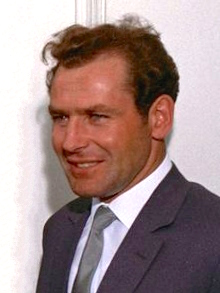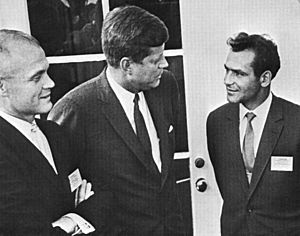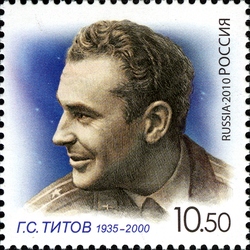Gherman Titov facts for kids
Quick facts for kids
Gherman Titov
|
|
|---|---|

Titov in 1962
|
|
| Born |
Gherman Stepanovich Titov
11 September 1935 Verkhneye Zhilino, West Siberian Krai, Russian SFSR, Soviet Union
|
| Died | 20 September 2000 (aged 65) |
| Resting place | Novodevichy Cemetery, Moscow |
| Nationality | Russian |
| Occupation | Pilot |
| Awards | Hero of the Soviet Union |
| Space career | |
| Cosmonaut | |
| Rank | General-Colonel, Soviet Air Force |
|
Time in space
|
1d 01h 18m |
| Selection | Air Force Group 1 |
| Missions | Vostok 2 |
| Signature | |
 |
|
Gherman Stepanovich Titov (Russian: Герман Степанович Титов; 11 September 1935 – 20 September 2000) was a Soviet cosmonaut. On 6 August 1961, he became the second person to orbit the Earth. He flew aboard the Vostok 2 spaceship. Before him, only Yuri Gagarin had orbited Earth on Vostok 1.
Titov was the fourth person to travel into space. This count includes American astronauts Alan Shepard and Gus Grissom, who made shorter suborbital flights. Titov was just under 26 years old when he launched. This makes him the youngest person ever to fly in space.
His flight showed that humans could live and work in space for longer periods. He was the first person to orbit Earth many times, completing 17 orbits. He was also the first to pilot a spaceship and spend more than a day in space. Titov was the first to sleep in orbit. He also experienced space sickness, becoming the first person to feel unwell and vomit in space.
Titov took the first manual photographs from orbit. This set a new standard for modern space photography. He was also the first to film Earth using a professional movie camera. He used it for ten minutes.
After his space flight, Titov continued to work for the Soviet space program. He played a big part in the Spiral project. In this project, he trained to be the first pilot of an orbital spaceplane. However, after Yuri Gagarin died in a plane accident in 1968, the Soviet government decided it could not risk losing its second cosmonaut. So, Titov's career as a test pilot ended.
Titov served in the Soviet Air Force and reached the rank of colonel-general. In his later years, in post-Soviet Russia, he became a politician for the Communist Party. Even though he was chosen second to fly into space after Gagarin, it was Titov who suggested that the Soviet government celebrate Cosmonautics Day every year on April 12. This is the day Gagarin made his historic flight.
Biography
Gherman Titov was born in the village of Verkhneye Zhilino. This village is in the Altai Krai region of Russia. He attended the Stalingrad Military Aviation School. After he finished school and became an air force pilot, he was chosen for cosmonaut training in 1960.
He flew the Vostok 2 mission. It launched on 6 August 1961. His flight lasted for 25.3 hours, and he orbited the Earth 17 times. His call sign during the mission was Eagle (Russian: Орёл). He landed near the town of Krasny Kut in Saratov Oblast, Russia. As mentioned, he was just under 26 years old at launch. He remains the youngest person to fly in space. Like most Soviet cosmonauts, Titov was a member of the Communist Party of the Soviet Union.
Titov was a very good sportsman. He especially enjoyed gymnastics.
Service in the Air Force made us strong, both physically and morally. All of us cosmonauts took up sports and PT seriously when we served in the Air Force. I know that Yuri Gagarin was fond of ice hockey. He liked to play goal keeper. Gherman Titov was a gymnastics enthusiast, Andriyan Nikolayev liked skiing, Pavel Popovich went in for weight lifting. I don't think I am wrong when I say that sports became a fixture in the life of the cosmonauts.
He was the first person to experience space sickness. This is like motion sickness but in space. He was also the first person to sleep in space. He slept for about one orbit. He was surprised to wake up with his arms floating in the air because there was no gravity. He went back to sleep after putting his arms under a safety belt. He slept 30 minutes longer than planned. He said, "Once you have your arms and legs arranged properly, space sleep is fine.... I slept like a baby."
Even though he felt space sickness during his flight, Titov celebrated after landing. His celebration was described as a "fit of euphoria." On his flight back to Kubishev for a debriefing, he surprised the medical staff. He opened and drank a beer, which was against the rules.
After his landing, Titov went to the hospital for more tests. Doctors wanted to make sure he was not sick. After his mission, some of his actions caused concern among those in the space program. Further tests showed that his behavior was not a side effect of the space sickness he experienced from zero gravity.
In 1962, Titov visited Seattle to see the Century 21 World's Fair. Reporters asked him how his space flight changed his view of life. He replied, "Sometimes people are saying that God is out there. I was looking around attentively all day but I didn't find anybody there. I saw neither angels nor God." This statement was used in Soviet anti-religion campaigns. However, it was sometimes wrongly said to have been spoken by Yuri Gagarin.
After his space flight, Titov held many important jobs in the Soviet space program. He retired in 1992. In 1995, he was elected to the State Duma. This is a part of the Russian government. He was a member of the Communist Party of the Russian Federation. He died from a cardiac arrest in his sauna at age 65 in Moscow. He was buried in the Novodevichy Cemetery.
Awards and Legacy
Gherman Titov received many important awards. He was given the title Hero of the Soviet Union. He also received two Orders of Lenin and many other medals. Other countries also honored him. He was named Hero of Socialist Labor of Bulgaria, Hero of Labour of Vietnam, and Hero of Mongolia.
A crater on the far side of the Moon is named after him. An island in Halong Bay is also named after him, called Ti Tốp Island.
On 6 August 2011, which was 50 years after Titov's flight, the Gherman Titov Museum was reopened. It was rebuilt and made bigger in his home village of Polkovnikovo, Altai Krai. The Titov Space Centre is also named in his honor.
Images for kids
-
Titov, Nikita Khrushchev and Yuri Gagarin at Red Square in Moscow, 20 November 1961
-
Titov on a Moldovan stamp
See also
 In Spanish: Guerman Titov para niños
In Spanish: Guerman Titov para niños
 | DeHart Hubbard |
 | Wilma Rudolph |
 | Jesse Owens |
 | Jackie Joyner-Kersee |
 | Major Taylor |





